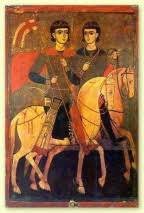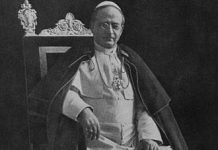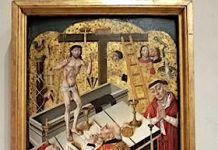Today we commemorate the early martyrs Nereus and Achilleus, soldiers, officers of the court, and converts, likely put to death under Emperor Domitian in the late 1st century. Other sources claim Diocletian in the third. Their lives are shrouded in legend, like many of the earliest martyrs. Saint Philip Neri, the founder of the Oratory in the sixteenth century, had a great and abiding devotion to them.
We also celebrate their fellow soldier-convert-saint-and-martyr Pancras, one of the most popular saints and place names in Britain – think of the massive train station that is named for him. He was put to death likely under the persecution of Diocletian, who was so impressed with the young lad’s determination in the face of imminent death for his Faith, that he promised the young lad wealth, riches and honour – but Pancras refused, seeing a far greater reward in heaven. And thither he went, decapitated, one of those commemorated in today’s Office of Readings from the final chapters of the Book of the Apocalypse:
I saw the souls of all who had been beheaded for having witnessed for Jesus and for having preached God’s word, and those who refused to worship the beast or his statue and would not have the brand-mark on their foreheads or hands
Previously, we also celebrated the martyr Saint Domitilla on this day, the ‘niece of Domitian’, but she was quietly dropped in the revisions of 1969, due to a lack of basis in the tradition.
Whoever they were and whenever they lived and died for the Faith, the glorious martyrs signify, shrouded in their legends, is that from the very beginning of the Church’s life Christians have faced persecution for the truth, as Christ said they would. There is nothing the world, the flesh or the devil – or any of his minions – can do to us that should cause us to lose hope. Veritas liberabit vos: The Son of God not only preached the truth, but claimed to be the Truth Himself, the Way to peace, freedom and eternal life in heaven. But, like those embarking on the trains at Saint Pancras station, we all have to make that choice which way we want to go, deep in our hearts, mind and conscience – where we are all ‘alone with God’:
The sea gave up all the dead who were in it; Death and Hades were emptied of the dead that were in them; and every one was judged according to the way in which he had lived.
Whatever strums und drangs this life offers, we may have hope, holding our heads high, even laughing and dancing on the way, for ’tis only in that true and abiding life we will find true rest, peace and fulfillment, where we all may meet merrily one day, Deo volente.
Sancti Nereus et Achileus, orate pro nobis!












